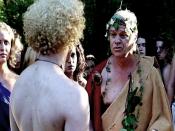There were approximately ninety-two plays written by Euripides in the 5th Century B.C. Of those ninety-two, eighteen still exist today. One of the eighteen remaining is "The Bacchae", a play about the return of the god Dionysus to Thebes, which won Euripides first prize in the Dionysia, a famous Athenian dramatic festival. Unfortunately, it was a prize he would never know about, for it was awarded to him after his death. Euripides was the last of the 'three great tragedists'; Himself, Aeschylus, and Sophocles. Both Aeschylus and Sophocles had more than double the amount of awards Euripides had received for his work, but Euripides has more work that still exists today, and is not thought of any less than either of the other two. Several of Euripides' plays are quite famous, including "The Bacchae". It is believe that it was famous around 4th Century B.C. because the play featured a male god, Dionysus, a god with feminine features (i.e.
Rosy cheeks, long blond curls, etc.), who embodied a mortal figure, walked among the mortals, and spoke like a mortal. One believes this was new to the first Greek audience, as in previous plays by Aeschylus and Sophocles, the male gods were enormous, booming and masculine. What is more interesting is that Dionysus was the protagonist of the play. In plays by the other two tragedists, the gods were usually just voices offstage or bit-parts with a minute long monologue. To see a male god onstage looking feminine and mortal must have been a new sight for the first Greek audience. Furthermore, they saw this mortal-like god interacting with other mortals! It is quite possible that at first view, Euripides seemed almost blasphemous and foul to the Greek public. However, some time after his death, Euripides was...


